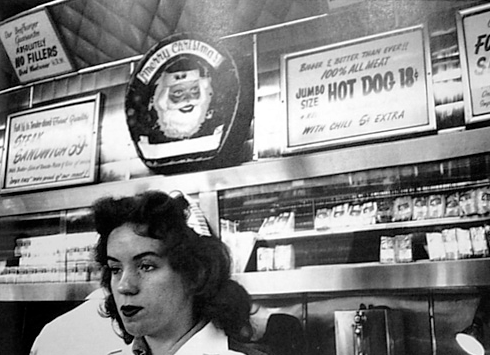
The current Robert Frank Exhibition at the Metropolitan Museum in New York is not only important because of the extraordinary work of the photographer. It is a beautiful example of ethnography and photography intermingling without the need to intellectualize or in Roland Barthes's terms, without the need to declare the message in an open and direct fashion. Drawing upon a set of experiences that saw Frank criss-cross America in the 1950's by car sometimes alone and sometimes with his family, the images bring the rich diversity of American life into a wonderful inventory of the banal, the unusual and the fantastic. The images were published as a book and much has been written about them and about the book itself. Frank set the book up as a sequence of images and if you take the time, a story begins to unfold. The core of the narrative to me is displacement. To varying degrees, Frank witnessed post-war America beginning to redefine itself. Many of the images link landscapes to faces and most of the faces seem to be searching for some sense of definition. A coffee shop becomes exotic not only because of its unusual signage but because the people in it gaze outwards searching to define their experiences. In fact, many of the images have people glancing backwards at the photographer as if to say, there is not much here, why are you interested? The desolation is best represented by an empty gas station where all you see is gas pumps set against a dry landscape.
The only book comparable to Robert Frank's was "Let Us Now Praise Famous Men," published in 1941. Both books share a fascination with the human gaze, with that look that comes from not being able to see what the photographer is doing. The subject of the photographs can never take control and in knowing this they give a gift to the photographer of their most private feelings. Both Walker Evans and Robert Frank understood the irony of communicating something of the essence of a person or situation *because* of the power they held. In so doing they left a heritage of American life that is openly steeped in artifice but never the less profound for doing so.